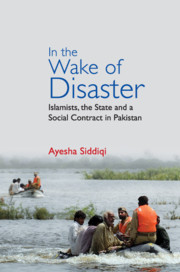Book contents
- Frontmatter
- Dedication
- Contents
- List of Figures, Boxes and Tables
- Acknowledgements
- Introduction: Setting the Scene
- 1 A Social Contract: State–Citizen Relations and Unfolding Disasters
- 2 The State as a Complex Web of Social Relations
- 3 The Ethnographic Social Contract
- 4 Advancing ‘Disaster Citizenship’
- 5 The Failing ‘Islamist Takeover’ in the Aftermath of the Indus Floods
- Conclusion: Disasters and the State–Citizen Relationship
- References
- Index
Conclusion: Disasters and the State–Citizen Relationship
Published online by Cambridge University Press: 24 April 2019
- Frontmatter
- Dedication
- Contents
- List of Figures, Boxes and Tables
- Acknowledgements
- Introduction: Setting the Scene
- 1 A Social Contract: State–Citizen Relations and Unfolding Disasters
- 2 The State as a Complex Web of Social Relations
- 3 The Ethnographic Social Contract
- 4 Advancing ‘Disaster Citizenship’
- 5 The Failing ‘Islamist Takeover’ in the Aftermath of the Indus Floods
- Conclusion: Disasters and the State–Citizen Relationship
- References
- Index
Summary
This book opens by presenting both the scholarly literature and the popular media narratives around the ‘absence’ of the state and the lack of a social contract in what is colloquially known as ‘interior’ Sindh. After clarifying the theory and methodology employed by this research it deconstructs the idea that the state is non-existent and that citizens in non-urban parts of Pakistan, such as lower Sindh, define the very terms of the social contract as a social interaction between themselves and their local wadera, pir or some other hereditary leader. It emphasizes that while traditional forms of leadership remain important, there is a wider, more comprehensive understanding of state–citizen relations, one that increasingly includes a more rights-based understanding of citizenship.
The focus in later chapters on the flooding disaster that affected Pakistan in 2010 and 2011 also reveals that the state reached out to its citizens in an unprecedented manner, and that citizens made increasing demands of this state, helping to push the citizenship framework forward. Evidence from the field demonstrates that despite increased attention to, and alarmist accounts of, Islamist groups such as the JuD reaching out to people where the state had ‘failed’, the construction of the state remained intact. In the aftermath of the floods of 2010 and 2011 in Sindh, people made demands on the state as the primary political actor and the larger social entity, the sarkar. The state, for its part, attempted to deliver disaster rescue and relief that began to be increasingly interpreted as a right by the people. My work, therefore, makes a case for greater attention to be paid to understanding and explaining concepts of the state and citizenship in non-urban parts of Pakistan, such as lower Sindh, rather than accepting the existing broad and generalised narratives, particularly around social structures.
As the discussion of the political families of Thatta, Badin and Tharparkar in Chapter 2 has illustrated, while social and hereditary relations around waderas and biraderis might be intuitively appealing, they are also analytically frustrating and theoretically limiting frameworks to theorise the state within them. This is particularly true in light of the work done by ethnographers who have attempted to study ‘the state’ in Pakistan and for years have been trying to say something different.
- Type
- Chapter
- Information
- In the Wake of DisasterIslamists, the State and a Social Contract in Pakistan, pp. 155 - 166Publisher: Cambridge University PressPrint publication year: 2019



